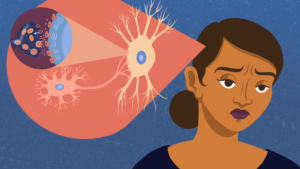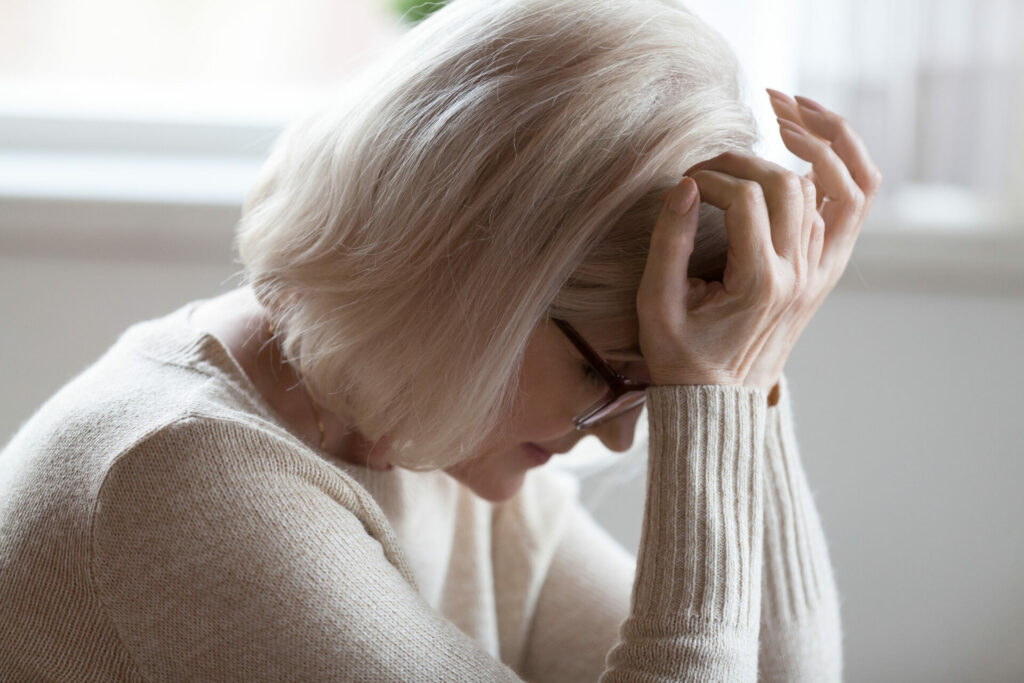Depression is a common mental health condition that affects millions of people each year. While there are many different types of depression, one form that is becoming increasingly common is hormonal depression. This type of depression can be caused by changes in hormone levels, which often occur during puberty, menopause, and pregnancy. If you are experiencing symptoms of hormonal depression, it is important to seek help from a doctor right away. In this blog post, we will discuss the causes and symptoms of hormonal depression, as well as treatment options.
Contents
What Is Hormonal Depression?
 One of the main kinds of depression that women experience is hormonal depression. This type of depression is caused by a chemical imbalance in the brain that is due to fluctuating hormone levels. It can occur during puberty, pregnancy, postpartum, perimenopause, and menopause. Symptoms of hormonal depression include mood swings, irritability, anxiety, crying spells, sleep changes, fatigue, and changes in appetite.
One of the main kinds of depression that women experience is hormonal depression. This type of depression is caused by a chemical imbalance in the brain that is due to fluctuating hormone levels. It can occur during puberty, pregnancy, postpartum, perimenopause, and menopause. Symptoms of hormonal depression include mood swings, irritability, anxiety, crying spells, sleep changes, fatigue, and changes in appetite.
Hormonal imbalances can be caused by a variety of things such as stress, birth control pills, thyroid problems, and menopause. If you think you may be suffering from hormonal depression it’s important to see your doctor so they can run some tests and determine the best course of treatment for you. Often therapy and medication are necessary to get hormone levels back on track.
If you are experiencing any of the symptoms of hormonal depression, don’t suffer in silence, reach out for help. There are many resources available to you and with treatment, you can start feeling like yourself again.
Hormonal depression is a real and serious condition that should not be ignored. If you think you may be suffering from it, please see your doctor as soon as possible. With proper diagnosis and treatment, you can start feeling better and get back to living your life.
Signs of Hormonal Depression

There are many signs of hormonal depression. Here are some of the most common ones:
Feeling Sad or Blue Most of The Time
One of the most common signs of hormonal depression is feeling sad or blue most of the time. This can be accompanied by a loss of interest in activities that you used to enjoy or a general feeling of fatigue. Feeling sad also increased appetite or weight gain.
Irritability
Another sign of hormonal depression is increased irritability. This may manifest as feeling easily frustrated, angry, or even impatient. You may also find yourself snapping at loved ones more often than usual.
Problems Sleeping
Hormonal depression can also cause problems with sleep. This may include difficulty falling asleep, waking up frequently during the night, or feeling exhausted upon waking up in the morning. Insomnia is a common symptom of clinical depression as well.
Changes in Appetite
Changes in appetite are another common sign of hormonal depression. Some people may experience a decrease in their appetite, while others may find themselves overeating or craving certain foods. These changes in eating habits can lead to weight loss or gain.
Constant Tiredness
If you’re constantly tired and have no interest in doing anything, it may be a sign of hormonal depression. This fatigue can be physical or mental, and it may make it difficult to concentrate or complete tasks. If you’re struggling with chronic fatigue, it’s important to talk to your doctor to rule out any underlying medical conditions.
Frequent Mood Swings
An individual with hormonal depression may experience sudden mood swings. These can range from feeling happy one minute to feeling sad and hopeless the next. These mood changes can be difficult to manage and often interfere with daily life.
Feeling Hopeless or Helpless
When you’re dealing with hormonal depression, you may feel like there’s no hope for improvement. This can lead to feelings of helplessness and despair. Feeling hopeless or helpless is a common symptom of clinical depression as well.
If you’re experiencing any of these signs, it’s important to talk to your doctor. Hormonal depression is a treatable condition, but it requires medical intervention. Don’t suffer in silence – reach out for help today.
Reasons Why Someone Has Hormonal Depression

Sometimes there can be an imbalance in the levels of certain hormones in the body which can lead to depression. This is more common in women during times such as pregnancy, after giving birth, and during menopause but it can also happen in men. It can be caused by problems with the thyroid gland or adrenal glands.
Other times, it could be due to taking medications that affect hormone levels, such as birth control pills or steroids. If you think your depression might be related to a hormonal problem, talk to your doctor about getting a blood test to check hormone levels.
Sometimes some other factors like sleep deprivation, stress, or poor nutrition can also lead to hormone imbalances. If you are not getting enough sleep, your body won’t have time to properly balance hormone levels. The same goes for if you’re constantly under a lot of stress or not eating a balanced diet.
Another reason that can lead to hormonal depression is the changes in seasons. For example, some people tend to get depressed in the winter because there is less sunlight. This is due to a decrease in the level of vitamin D that your body gets from exposure to sunlight.
Certain medical conditions can lead to hormone imbalances and, as a result, depression. These include polycystic ovary syndrome (PCOS), premenstrual dysphoric disorder (PMDD), and perimenopause. PCOS is a condition where the ovaries produce too much testosterone which can lead to mood swings, weight gain, and other symptoms. PMDD is similar to PMS but with more severe symptoms that can include depression, anxiety, and irritability. Perimenopause is the time leading up to menopause when hormone levels start to decline and can cause hot flashes, night sweats, and other symptoms.
Does Hormonal Depression Affect Anyone?

Hormonal depression may have several causes. It can be brought on by changes in estrogen levels during menopause, perimenopause, and postpartum. It can also be caused by changes in testosterone levels in both men and women. Hormonal imbalances can also lead to depression.
Some of the impacts of hormonal depression are:
Impacts Daily Life
Another impact is that it can cause problems with work, school, and social activities. It can be hard to concentrate, make decisions, or remember things. You may have trouble completing projects on time or keeping up with responsibilities at home or work. Sometimes, people with this type of depression may need to take a leave of absence from work or school.
Increases the Risk of Other Mental Health Conditions
Hormonal depression may also increase the risk of developing other mental health conditions, such as anxiety disorders, eating disorders, substance use disorders, and bipolar disorder. There may be many factors that contribute to the development of these conditions, but hormonal imbalances are one possible trigger.
Causes Mood swings
Those who experience hormonal depression may also notice more extreme mood swings. For example, you may feel happy one minute and then suddenly feel very sad the next. These sudden mood changes can be hard to manage and may interfere with your daily life. Sometimes there can also be physical symptoms that accompany the mood swings, such as headaches or stomachaches.
Causes Constant Fatigue
Another common symptom of the type of depression is fatigue. You may feel tired all the time, even after a good night’s sleep. This can make it hard to get through your day-to-day activities. The fatigue may also be accompanied by low energy levels and decreased motivation.
How To Treat Hormonal Depression?

Treating hormonal depression can be tricky. That’s because, to treat it effectively, you need to identify the underlying cause of the problem. Once you know what’s causing your hormone levels to fluctuate, you can then take steps to correct the issue.
There are a few different ways that you can go about treating hormonal depression. Some of these are:
Medications
One of the most common ways to treat hormonal depression is through the use of medications. Your doctor may prescribe you antidepressants or other medications that can help to stabilize your mood and keep your hormone levels in check. Some of these medications are:
- SSRIs (selective serotonin reuptake inhibitors)
- SNRIs (serotonin and norepinephrine reuptake inhibitors)
- MAOIs (monoamine oxidase inhibitors)
Hormone Replacement Therapy
Another way to treat a type of depression is through hormone replacement therapy. This involves replacing the hormones that are out of balance in your body. This can be done through a variety of methods, including:
- Oral contraceptives
- Birth control implants
- Hormone injections
- Transdermal patches
Surgery
In some cases, surgery may be necessary to treat hormonal depression. This is usually only the case if other treatments have failed to work. Surgery options for treating this type of depression include:
- Ovarian drilling
- Oophorectomy
- Hysterectomy
Therapy
Another way to treat a type of depression is through therapy. This can be either in the form of individual therapy, where you meet with a therapist one-on-one to work on your issues, or group therapy, where you meet with a group of people who are dealing with similar issues. Some of these therapies that can be used to treat hormonal depression are:
- Cognitive-behavioral therapy
- Interpersonal therapy
- Psychodynamic therapy
Lifestyle Changes
Making lifestyle changes can also help to treat hormonal depression. This may include things like getting more exercise, eating a healthy diet, getting enough sleep, and managing stress better. These changes can help to balance out your hormones and make you feel better overall.
If you think you may be suffering from hormonal depression, it’s important to talk to your doctor. They can help to diagnose the problem and recommend the best treatment option for you. With the right treatment, you can start feeling better and get back to living your life.
How To Prevent Hormonal Depression?
Preventing this type of depression is tricky. Many things can trigger it, and everyone experiences it differently. However, there are some general things you can do to try and avoid it.
These things are:
- Educate yourself on the signs and symptoms of hormonal depression. This way, you will be able to identify it early and get treatment as soon as possible.
- Talk to your doctor about your risk factors. If you have a family history of depression or other mental health disorders, be sure to let them know.
- Be proactive about managing your stress levels. Stress can trigger hormonal imbalances, so it is important to find healthy ways to cope with it.
- Exercise regularly and eat a balanced diet. These things help to keep your hormones in check and can improve your mood overall.
If you do experience hormonal depression, there are treatments available that can help you feel better.
Conclusion
Hormonal depression is a real thing, and it can be extremely debilitating. If you think you might be suffering from it, reach out to your doctor. There are treatments available that can help. Hormonal imbalances are nothing to scoff at. If you’re dealing with depression, anxiety, or any other mental health issue, don’t hesitate to reach out for help.
Some people care and can offer assistance. You are not alone in this fight. The takeaway here is that if you think you might be struggling with hormonal depression, please don’t hesitate to seek professional help! There are treatment options available and there is no shame in admitting that you need some extra support. Remember, you are not alone! We hope this article has been helpful and informative.
Hope this article was of help to you! If you are suffering from hormonal depression, you may seek help from Therapy Mantra. We have a team of highly trained and experienced therapists who can provide you with the tools and skills necessary for overcoming hormonal depression. Contact us today to schedule an online therapy or download our free Android or iOS app for more information.


